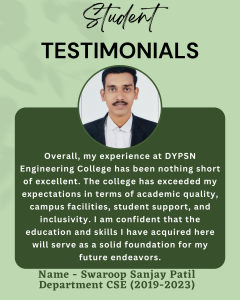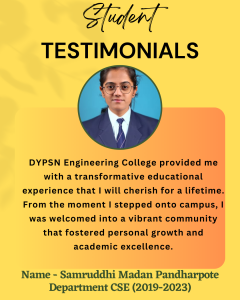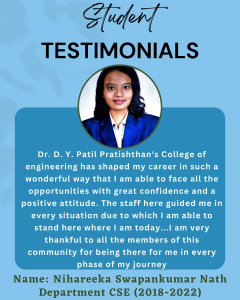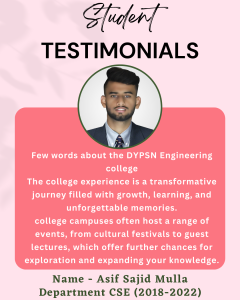📌 Department Information
| Attribute | Details |
|---|---|
| UG Degree Course Offered | Bachelor of Engineering (Computer Science & Engineering) |
| UG Course Duration | 4 Years |
| UG Year of Establishment | 2014 |
| UG Intake | 180 |
| Approved By | AICTE, New Delhi |
| Affiliated To | Shivaji University, Kolhapur |
| College DTE Code | EN 6839 |
| DTE General Choice Code | 683924210 |
🎯 Vision
To produce competent computer professionals having strong fundamental knowledge, technical skills, and work ethics.
🚀 Mission
- To promote growth of an individual by imparting comprehensive prerequisite knowledge using latest tools and technologies.
- To inculcate professionalism, social awareness, and promote creativity through mentoring.
- To establish industry-institute interaction to enable students to cater to ever-changing industry demands and nurture entrepreneurial qualities.
- To provide state-of-the-art environment and opportunities for soft skills and professional skill development.
💻 About the Department
The department labs are fully equipped with the latest configuration, licensed software, and internet facility. Department has experienced and dynamic faculty members. The discipline of Computer Science & Engineering has core strengths in the areas of algorithms, data mining, data science, network security, computer graphics, and computer architecture.
The department collaborates with companies like Microsoft, IBM, Google, and Barclays to help students prepare for successful careers. We strive for excellence in engineering education and research, fostering a professional attitude and industry-relevant skills in our students.
Program Educational Objectives (PEOs)
The Educational Objectives of the Computer Science and Engineering Programme are:
- 🎯 PEO1: To work and contribute to the growth of the organization utilizing their technical abilities.
- 📚 PEO2: Continue upgrading their capabilities through lifelong learning and contribute to the IT sector.
- 💡 PEO3: To provide the best possible service as an employee or entrepreneur for sustainable development in society.
Programme Outcomes (POs)
Computer Science and Engineering graduates will be able to:
- 📚 PO1 – Engineering Knowledge: Apply mathematics, science, and engineering principles to solve complex problems.
- 🔍 PO2 – Problem Analysis: Identify, formulate, and analyze engineering problems using research and first principles.
- 🎨 PO3 – Design Solutions: Develop innovative and safe engineering solutions while considering societal and environmental factors.
- 🔬 PO4 – Research & Investigations: Use research methodologies to analyze and interpret data for valid engineering conclusions.
- 🛠️ PO5 – Modern Tool Usage: Apply modern engineering tools and software effectively, recognizing their limitations.
- 🏛️ PO6 – Engineer & Society: Assess societal, health, safety, legal, and cultural issues in engineering practice.
- 🌍 PO7 – Environment & Sustainability: Understand engineering solutions’ impact on the environment and work towards sustainability.
- ⚖️ PO8 – Ethics: Commit to professional ethics and engineering responsibilities.
- 🤝 PO9 – Teamwork: Work effectively as an individual and as part of a diverse team.
- 📢 PO10 – Communication: Communicate effectively through reports, presentations, and discussions.
- 📊 PO11 – Project Management & Finance: Apply engineering and management principles for project execution.
- 🔄 PO12 – Life-long Learning: Continuously learn and adapt to technological changes.
Program Specific Outcomes (PSO)
Computer Science and Engineering graduates will be able to:
- 💻 PSO1 – Knowledge of Recent Technologies: Demonstrate the knowledge of recent technologies like Web Development, Mobile Computing, Cloud Computing, Big Data Analytics, Deep Learning, etc.
- 🖥️ PSO2 – Knowledge of Programming Languages: Demonstrate the knowledge of Programming languages in computer-based problem solving.
- 🔧 PSO3 – Software Development: Demonstrate the ability to analyze, design, and implement software solutions effectively.
| Dr. D. Y. PatilPratishthan’s College of Engineering Salokhenagar, Kolhapur | |||
| Department of Computer Science & Engineering | |||
| SEMESTER – III | |||
| Sr. No. | Subjects | Subject Code | |
| S.Y | Applied Mathematics | BSC – CS301 | |
| 1 | Describe the statistical data numerically by using Lines of regression and Curve fittings. | ||
| 2 | Illustrate basic problems in probability theory, including problems involving the binomial, Poisson, and normal distributions. | ||
| 3 | Calculate numerical Integration. | ||
| 4 | Solve fuzzy sets using linguistic words and represent these sets by membership functions, convexity, Normality, support,etc. | ||
| 5 | Solve examples on the principle in performing fuzzy number arithmetic operations such as Addition, Multiplication & fuzzy equation. |
||
| S.Y | Discrete Mathematics & Structures | PCC-CS302 | |
| 1 | Understand the Basic concept of Discrete Mathematics | ||
| 2 | Illustrate mathematical knowledge in programming | ||
| 3 | Identify the basic set concepts & operations onset. | ||
| 4 | Identify data structures using graph concepts. | ||
| 5 | Apply basic concepts of probability to solve real world problem. | ||
| S.Y | Data Structures | PCC- CS303 | |
| 1 | Explain the basic concepts of data structures | ||
| 2 | Interpret appropriate data structure for specific application. | ||
| 3 | Analyze programming problem statements. | ||
| 4 | Choose appropriate sorting and searching algorithms. | ||
| 5 | Design the solution to the given software problem with appropriate data structure. | ||
| S.Y | Computer Networks – I | PCC- CS304 | |
| 1 | Demonstrate concepts of Computer Networks. | ||
| 2 | Explain OSI and TCP/IP layered architecture | ||
| 3 | Identify network and data link layer. | ||
| 4 | Analyze the protocol structure using network analyzing tools. | ||
| 5 | Apply the principals of socket programming in the networks. | ||
| S.Y | Microprocessors | PCC- CS305 | |
| 1 | Explain architecture of 8085 microprocessor and microcontroller. | ||
| 2 | Describe Programming models of 8086 microprocessor. | ||
| 3 | Explore the higher processor architecture. | ||
| 4 | Apply the concept of assembly instructions and use in assembly language problem. | ||
| S.Y | C programming | PCC- CS306 | |
| 1 | Understand the principles of procedure oriented problem solving and programming. | ||
| 2 | Explain programming fundamentals including statements, control flow and recursion | ||
| 3 | Formulate problems and implement algorithms in C | ||
| 4 | Analyze and use data structures to solve the complex problem statements. | ||
| 5 | Apply file operations using file handling concepts through developing applications. | ||
| S.Y | Soft Skills | HM- CS307 | |
| 1 | Communicate effectively through verbal/oral communication and improve the listening skills | ||
| 2 | Participate actively in group discussion / meetings / interviews and prepare &deliver
Presentations. |
||
| 3 | Function effectively in multi-disciplinary and heterogeneous teams through the knowledge of team work, Inter-personal relationships, conflict management and leadership quality. | ||
| 4 | Develop and nurture the soft skills of the students through individual and group activities. | ||
|
|||||
| SEMESTER – V | |||||
| Sr. No. | Subjects | Subject Code | |||
| T.Y | Information Security | PCC-CS501 | |||
| 1 | Understand principles of Crypto-systems. | ||||
| 2 | Compare various security services and mechanisms. | ||||
| 3 | Apply features of PGP, S/MIME, DSA, IPSec, SSL in their profession. | ||||
| 4 | Choose precautionary steps of their personal computing system from possible threats and attacks. | ||||
| 5 | Discover newer vulnerabilities by providing the solutions to them. | ||||
| T.Y | System Programming | PCC- CS502 | |||
| 1 | Understand the role of system programs and application programs. | ||||
| 2 | Explain the basics of system programs like editors, compiler, assembler, linker, loader, interpreter and debugger | ||||
| 3 | Recognize the various concepts of assemblers and macro – processors. | ||||
| 4 | Design the various phases of compiler and compare its working with assembler. | ||||
| T.Y | Object-Oriented Modeling & Design | PCC- CS503 | |||
| 1 | Remember the software engineering and object-oriented concepts. | ||||
| 2 | Recognize the Object based software systems | ||||
| 3 | Identify UML notations and compare with OMT. | ||||
| 4 | Construct Object Oriented view of the system | ||||
| 5 | Design a Software System using OMT& UML design techniques. | ||||
| T.Y | Computer Algorithms | PCC- CS504 | |||
| 1 | Understand the basic concept of algorithm, Types of algorithms and performance analysis. | ||||
| 2 | Demonstrate different algorithm methods with analysis. | ||||
| 3 | Build an algorithm for given problem statement and analyze its space and time complexity. | ||||
| 4 | Apply different algorithm methods to solve complex computational problems. | ||||
| 5 | Examine the problem to determine polynomial and non- polynomial based on its nature | ||||
| T.Y | Internet of Things | OEC-CS506 | |||
| 1 | Understand basic concepts of IoT | ||||
| 2 | Apply RFID technology in various applications. | ||||
| 3 | Build programs for basic applications | ||||
| 4 | Implement different communication technologies in IoT systems. | ||||
| T.Y | Java Programming | PCC- CS507 | |||
| 1 | Explain the principles of object-oriented problem solving & programming. | ||||
| 2 | Illustrate code reusability, security and abstraction using inheritance, package and interface. | ||||
| 3 | Develop reliable and user-friendly applications using exception handling and file handling. | ||||
| 4 | Create desktop apps using SWING and event handling and also illustrate multithreading concepts. | ||||
| 5 | Apply network programming concept & develop web applications using servlet and jsp. | ||||
| T.Y | Business English | HM- CS508 | |||
| 1 | Recognize basic skills to deal with people in business situations | ||||
| 2 | Develop knowledge of key business concepts worldwide | ||||
| 3 | Construct basic business reports, letters, e-mails etc | ||||
| 4 | Expand vocabulary related to general business situations | ||||
| 5 | Develop confidence to deal with people and basic issues in the business world | ||||
| Dr. D. Y. PatilPratishthan’s College of Engineering Salokhenagar, Kolhapur | ||
| Department of Computer Science & Engineering | ||
| SEMESTER – VII | ||
| Sr. No. | Subjects | Subject Code |
| B.Tech | Advanced Computer Architecture | PCC-CS701 |
| 1 | Demonstrate concepts of parallelism in hardware/software. | |
| 2 | Explain memory organization and mapping techniques | |
| 3 | Identify architectural features of advanced processors. | |
| 4 | Analyze data flow in arithmetic algorithms. | |
| 5 | Develop software to solve computationally intensive problems | |
| B.Tech | Cloud Computing | PCC- CS702 |
| 1 | Explain basic concepts, key technologies, strengths, and limitations of cloud computing | |
| 2 | Differentiate several deployment models and services of cloud | |
| 3 | Identify the virtualization concepts | |
| 4 | Analyze the various security issues in cloud computing | |
| 5 | Discover appropriate algorithms and approaches for real time issues | |
| B.Tech | Advanced Database Systems | PCC- CS703 |
| 1 | Understand and identify issues arising from parallel and distributed processing of data. | |
| 2 | Identify appropriate database and construct solution to real world problems of storing large data. | |
| 3 | Compare NoSQL databases with each other and Relational Database Systems. | |
| 4 | Utilize SQL cursors, triggers, stored procedures, and procedural SQL to write complex SQL scripts. | |
| 5 | Build database administration tasks and security measures. | |
| B.Tech | Elective-I Artificial Intelligence | PCE- CS704 |
| 1 | Explain Artificial Intelligence (AI) methods and describe their foundations. | |
| 2 | Discuss current scope and limitations of AI and societal implications. | |
| 3 | Illustrate knowledge of reasoning and knowledge representation for solving real world problems. | |
| 4 | Apply basic principles of AI in solutions that require problem solving, inference, perception, knowledge representation and learning. | |
| 5 | Analyze how search algorithms play vital role in problem solving. | |
| B.Tech | Web Technologies | PCC- CS705 |
| 1 | Demonstrate the use of client side scripting | |
| 2 | Demonstrate web application using PHP. | |
| 3 | Construct web application using MVC and Angular JS. | |
| 4 | Construct use of server side technologies | |
| 5 | Apply the use of server side technologies | |
| B.Tech | Project-I | PW- CS706 |
| 1 | Explain the need of a software project for the society | |
| 2 | Identify requirement analysis like functional and technical requirements for the project | |
| 3 | Design documents for the project consisting of Architecture and diagrams with analysis. | |
| 5 | Construct technical report consisting of Requirement specification, Analysis and Design of Project | |
Departmental Advisory Board (DAB)
The Departmental Advisory Board (DAB) has been framed with the objective of staying up-to-date with the latest industry requirements and incorporating necessary components into the curriculum.
The DAB is composed of members from eminent institutions, industry, alumni, and faculty. Below is the current composition of the DAB:
| S.No | Name of the Member | Designation | Role |
|---|---|---|---|
| 1 | Dr. Suresh D. Mane | Principal | 🏅 Chairman |
| 2 | Dr. Shivaleela R. Aralimatti | Professor & Head | 🎤 Convener |
| 3 | Dr. Shivani Shivraj Kale | Associate Professor | 🗣️ Co-Convener |
| 4 | Dr. Dattatraya V. Kodavade | Professor, Nominee of Faculty | 📚 Academic Expert |
| 5 | Mr. Abhijeet Patil | tCognition, IT Park, Kolhapur | 💼 Industrial Expert |
| 6 | Mr. Tejas S. Kamble | ITC InfoTech, Pune | 💼 Industrial Expert |
| 7 | Ms. Nihareeka S. Nath | Software Engineer, LTIMindtree, Pune | 👩💻 Alumni |
| 8 | Mr. Mahesh Y. Sutar | PlM Developer, HCL Technologies, Pune | 👨💻 Alumni |
| 9 | Mr. Jagannath V. Ware | Dean (Academics), Assistant Professor | 🧑🏫 Member (Faculty) |
| 10 | Mr. Sanjiv S. Deshpande | Assistant Professor (Electrical Department) | 🧑🏫 Member (Faculty) |
| 11 | Mrs. Preeti M. Bhosle | Training & Placement Officer (TPO) | 📋 Member (TPO) |
| 12 | Mr. Suraj R. Bhosale | Third Year Student, CSE | 👨🎓 Member (Student) |
| 13 | Mrs. Archana S. Nath | – | 👩👧 Member (Parent) |
| 14 | Mr. Yashwant N. Sutar | – | 👨👧 Member (Parent) |
Departmental Advisory Board (DAB) – Continuously enhancing the curriculum to meet the needs of the industry and society. Stay tuned for more updates!
Summary of MOU
| Sr.No. | Organisation with which MoU is signed | Name of the institution/ industry/ corporate house | Year of signing MOU | Duration | List the actual activities under each MOU year wise | Number of students / teachers participated under MOUs |
|---|---|---|---|---|---|---|
| 1. | DYPSN | KRACKiN | 20/11/2020 | Three years | Expert lecture For B. Tech Students on 02/12/2020 | 28 |
| 2. | DYPSN | FUEL | 10/01/2021 | One year | Expert lecture For B. Tech Students on 02/02/2021 | 10 |
| 3. | DYPSN | Testbook edu solutions private limited | 18/11/2021 | One year | Guest Lecture For B. Tech Students on 06/12/2021 | 18 |
| 4. | DYPSN | BOLT | 07/12/2021 | Three years | Guest Lecture For B. Tech Students on 27/12/2021 | 15 |
| 5. | DYPSN | Soft Musk | 27/01/2022 | One year | Online training For All SY, TY, B. Tech Students on 27/02/2022 | 15 |
| 6. | DYPSN | TATVA LIFE SKILLS KNOWLEDGE REDEFINED | 11/04/2022 | Two year | Expert lecture For All TY, BY Students on 18/04/2022 | 35 |
| Sr. No. | Type of Innovative Teaching Methods | Description | Remarks or Comments |
|---|---|---|---|
| 1 | Google Classroom | Faculty Members deliver important Concepts using this mode also | Source: Google Inc. |
| 2 | MOODLE | Student feedback, Assignments & information is available to students on MOODLE for use | |
| 3 | Websites/Blogs | Faculty members also have their own website/blogs for sharing knowledge with students. | |
| 4 | ICT / PPTs | Use of ICT is also employed by faculty | Source: Self Prepared PPTs |
| 5 | Virtual Labs | Use of Virtual Labs is also employed by faculty | Source: COEP, IITs etc. |
| 6 | NPTEL Videos | Effective Teaching is carried out with the help of NPTEL Videos also. | Source: IITs |
| 7 | Spoken Tutorials | Students are made available with Spoken Tutorials Lectures | |
| 8 | Group Discussion/Pair-Think-Share | In-class Group Discussions are carried out for effective learning | |
| 9 | Industrial Visits/Seminars/Workshops | Industrial Visits, Seminars, Expert Lectures & Workshops are conducted in order to help students learn beyond the syllabus | Resource Persons from Vast Areas of Expertise |



